- Home
- Ian Fleming
Bond 08 - For Your Eyes Only Page 13
Bond 08 - For Your Eyes Only Read online
Page 13
Bond set off towards it along the tide-line.
‘Ahem.’
The hands flew to the top scrap of bikini and pulled it up. Bond walked into her line of vision and stood looking down. The bright shadow of the umbrella covered only her face. The rest of her – a burned cream body in a black bikini on a black and white striped bath-towel – lay offered to the sun.
She looked up at him through half-closed eye-lashes. ‘You are five minutes early and I told you to knock.’
Bond sat down close to her in the shade of the big umbrella. He took out a handkerchief and wiped his face. ‘You happen to own the only palm tree in the whole of this desert. I had to get underneath it as soon as I could. This is the hell of a place for a rendezvous.’
She laughed. ‘I am like Greta Garbo. I like to be alone.’
‘Are we alone?’
She opened her eyes wide. ‘Why not? You think I have brought a chaperone?’
‘Since you think all men are pigs …’
‘Ah, but you are a gentleman pig,’ she giggled. ‘A milord pig. And anyway, it is too hot for that kind of thing. And there is too much sand. And besides this is a business meeting, no? I tell you stories about drugs and you give me a diamond clip. From Van Cleef. Or have you changed your mind?’
‘No. That’s how it is. Where shall we begin?’
‘You ask the questions. What is it you want to know?’ She sat up and pulled her knees to her between her arms. Flirtation had gone out of her eyes and they had become attentive, and perhaps a little careful.
Bond noticed the change. He said casually, watching her: ‘They say your friend Colombo is a big man in the game. Tell me about him. He would make a good character for my book – disguised, of course. But it’s the detail I need. How does he operate, and so on? That’s not the sort of thing a writer can invent.’
She veiled her eyes. She said: ‘Enrico would be very angry if he knew that I had told any of his secrets. I don’t know what he would do to me.’
‘He will never know.’
She looked at him seriously. ‘Lieber Mr Bond, there is very little that he does not know. And he is also quite capable of acting on a guess. I would not be surprised’ – Bond caught her quick glance at his watch – ‘if it had crossed his mind to have me followed here. He is a very suspicious man.’ She put her hand out and touched his sleeve. Now she looked nervous. She said urgently: ‘I think you had better go now. This has been a great mistake.’
Bond openly looked at his watch. It was three-thirty. He moved his head so that he could look behind the umbrella and back down the beach. Far down by the bathing huts, their outlines dancing slightly in the heat haze, were three men in dark clothes. They were walking purposefully up the beach, their feet keeping step as if they were a squad.
Bond got to his feet. He looked down at the bent head. He said drily: ‘I see what you mean. Just tell Colombo that from now on I’m writing his life-story. And I’m a very persistent writer. So long.’ Bond started running up the sand towards the tip of the peninsula. From there he could double back down the other shore to the village and the safety of people.
Down the beach the three men broke into a fast jog-trot, elbows and legs pounding in time with each other as if they were long-distance runners out for a training spin. As they jogged past the girl, one of the men raised a hand. She raised hers in answer and then lay down on the sand and turned over – perhaps so that her back could now get its toasting, or perhaps because she did not want to watch the man-hunt.
Bond took off his tie as he ran and put it in his pocket. It was very hot and he was already sweating profusely. But so would the three men be. It was a question who was in better training. At the tip of the peninsula, Bond clambered up on to the sea-wall and looked back. The men had hardly gained, but now two of them were fanning out to cut round the edge of the golf course boundary. They did not seem to mind the danger notices with the skull and crossbones. Bond, running fast down the wide sea-wall, measured angles and distances. The two men were cutting across the base of the triangle. It was going to be a close call.
Bond’s shirt was already soaked and his feet were beginning to hurt. He had run perhaps a mile. How much farther to safety? At intervals along the sea-wall the breeches of antique cannon had been sunk in the concrete. They would be mooring posts for the fishing fleets sheltering in the protection of the lagoons before taking to the Adriatic. Bond counted his steps between two of them. Fifty yards. How many black knobs to the end of the wall – to the first houses of the village? Bond counted up to thirty before the line vanished into the heat haze. Probably another mile to go. Could he do it, and fast enough to beat the two flankers? Bond’s breath was already rasping in his throat. Now even his suit was soaked with sweat and the cloth of his trousers was chafing his legs. Behind him, three hundred yards back, was one pursuer. To his right, dodging among the sand-dunes and converging fast, were the other two. To his left was a twenty-foot slope of masonry to the green tide ripping out into the Adriatic.
Bond was planning to slow down to a walk and keep enough breath to try and shoot it out with the three men, when two things happened in quick succession. First he saw through the haze ahead a group of spear-fishermen. There were about half a dozen of them, some in the water and some sunning themselves on the sea-wall. Then, from the sand-dunes came the deep roar of an explosion. Earth and scrub and what might have been bits of a man fountained briefly into the air, and a small shock-wave hit him. Bond slowed. The other man in the dunes had stopped. He was standing stock-still. His mouth was open and a frightened jabber came from it. Suddenly he collapsed on the ground with his arms wrapped round his head. Bond knew the signs. He would not move again until someone came and carried him away from there. Bond’s heart lifted. Now he had only about two hundred yards to go to the fishermen. They were already gathering into a group, looking towards him. Bond summoned a few words of Italian and rehearsed them. ‘Mi Ingles. Prego, dove il carabinieri.’ Bond glanced over his shoulder. Odd, but despite the witnessing spear-fishers, the man was still coming on. He had gained and was only about a hundred yards behind. There was a gun in his hand. Now, ahead, the fishermen had fanned out across Bond’s path. They had harpoon guns held at the ready. In the centre was a big man with a tiny red bathing-slip hanging beneath his stomach. A green mask was slipped back on to the crown of his head. He stood with his blue swim-fins pointing out and his arms akimbo. He looked like Mr Toad of Toad Hall in Technicolor. Bond’s amused thought died in him stillborn. Panting, he slowed to a walk. Automatically his sweaty hand felt under his coat for the gun and drew it out. The man in the centre of the arc of pointing harpoons was Enrico Colombo.
Colombo watched him approach. When he was twenty yards away, Colombo said quietly: ‘Put away your toy, Mr Bond of the Secret Service. These are Co2 harpoon guns. And stay where you are. Unless you wish to make a copy of Mantegna’s St Sebastian.’ He turned to the man on his right. He spoke in English. ‘At what range was that Albanian last week?’
‘Twenty yards, padrone. And the harpoon went right through. But he was a fat man – perhaps twice as thick as this one.’
Bond stopped. One of the iron bollards was beside him. He sat down and rested the gun on his knee. It pointed at the centre of Colombo’s big stomach. He said: ‘Five harpoons in me won’t stop one bullet in you, Colombo.’
Colombo smiled and nodded, and the man who had been coming softly up behind Bond hit him once hard in the base of the skull with the butt of his Luger.
When you come to from being hit on the head the first reaction is a fit of vomiting. Even in his wretchedness Bond was aware of two sensations – he was in a ship at sea, and someone, a man, was wiping his forehead with a cool wet towel and murmuring encouragement in bad English. ‘Is okay, amigo. Take him easy. Take him easy.’
Bond fell back on his bunk, exhausted. It was a comfortable small cabin with a feminine smell and dainty curtains and colours. A sailor in a tattered vest
and trousers – Bond thought he recognized him as one of the spear-fishermen – was bending over him. He smiled when Bond opened his eyes. ‘Is better, yes? Subito okay.’ He rubbed the back of his neck in sympathy. ‘It hurts for a little. Soon it will only be a black. Beneath the hair. The girls will see nothing.’
Bond smiled feebly and nodded. The pain of the nod made him screw up his eyes. When he opened them the sailor shook his head in admonition. He brought his wrist-watch close up to Bond’s eyes. It said seven o’clock. He pointed with his little finger at the figure nine. ‘Mangiare con Padrone, Si?’
Bond said: ‘Si.’
The man put his hand to his cheek and laid his head on one side. ‘Dormire.’
Bond said ‘Si’ again and the sailor went out of the cabin and closed the door without locking it.
Bond got gingerly off the bunk and went over to the wash-basin and set about cleaning himself. On top of the chest of drawers was a neat pile of his personal belongings. Everything was there except his gun. Bond stowed the things away in his pockets, and sat down again on the bunk and smoked and thought. His thoughts were totally inconclusive. He was being taken for a ride, or rather a sail, but from the behaviour of the sailor it did not seem that he was regarded as an enemy. Yet a great deal of trouble had been taken to make him prisoner and one of Colombo’s men had even, though inadvertently, died in the process. It did not seem to be just a question of killing him. Perhaps this soft treatment was the preliminary to trying to make a deal with him. What was the deal – and what was the alternative?
At nine o’clock the same sailor came for Bond and led him down a short passage to a small, blowzy saloon, and left him. There was a table and two chairs in the middle of the room, and beside the table a nickel-plated trolley laden with food and drinks. Bond tried the hatchway at the end of the saloon. It was bolted. He unlatched one of the portholes and looked out. There was just enough light to see that the ship was about two hundred tons and might once have been a large fishing-vessel. The engine sounded like a single diesel and they were carrying sail. Bond estimated the ship’s speed at six or seven knots. On the dark horizon there was a tiny cluster of yellow lights. It seemed probable that they were sailing down the Adriatic coast.
The hatchway bolt rattled back. Bond pulled in his head. Colombo came down the steps. He was dressed in a sweat-shirt, dungarees and scuffed sandals. There was a wicked, amused gleam in his eyes. He sat down in one chair and waved to the other. ‘Come, my friend. Food and drink and plenty of talk. We will now stop behaving like little boys and be grown-up. Yes? What will you have – gin, whisky, champagne? And this is the finest sausage in the whole of Bologna. Olives from my own estate. Bread, butter, Provelone – that is smoked cheese – and fresh figs. Peasant food, but good. Come. All that running must have given you an appetite.’
His laugh was infectious. Bond poured himself a stiff whisky and soda, and sat down. He said: ‘Why did you have to go to so much trouble? We could have met without all these dramatics. As it is you have prepared a lot of grief for yourself. I warned my chief that something like this might happen – the way the girl picked me up in your restaurant was too childish for words. I said that I would walk into the trap to see what it was all about. If I am not out of it again by tomorrow midday, you’ll have Interpol as well as Italian police on top of you like a load of bricks.’
Colombo looked puzzled. He said: ‘If you were ready to walk into the trap, why did you try and escape from my men this afternoon? I had sent them to fetch you and bring you to my ship, and it would all have been much more friendly. Now I have lost a good man and you might easily have had your skull broken. I do not understand.’
‘I didn’t like the look of those three men. I know killers when I see them. I thought you might be thinking of doing something stupid. You should have used the girl. The men were unnecessary.’
Colombo shook his head. ‘Lisl was willing to find out more about you, but nothing else. She will now be just as angry with me as you are. Life is very difficult. I like to be friends with everyone, and now I have made two enemies in one afternoon. It is too bad.’ Colombo looked genuinely sorry for himself. He cut a thick slice of sausage, impatiently tore the rind off it with his teeth and began to eat. While his mouth was still full he took a glass of champagne and washed the sausage down with it. He said, shaking his head reproachfully at Bond: ‘It is always the same, when I am worried I have to eat. But the food that I eat when I am worried I cannot digest. And now you have worried me. You say that we could have met and talked things over – that I need not have taken all this trouble.’ He spread his hands helplessly. ‘How was I to know that? By saying that, you put the blood of Mario on my hands. I did not tell him to take a short cut through that place.’ Colombo pounded the table. Now he shouted angrily at Bond. ‘I do not agree that this was all my fault. It was your fault. Yours only. You had agreed to kill me. How does one arrange a friendly meeting with one’s murderer? Eh? Just tell me that.’ Colombo snatched up a long roll of bread and stuffed it into his mouth, his eyes furious.
‘What the hell are you talking about?’
Colombo threw the remains of the roll on the table and got to his feet, holding Bond’s eyes locked in his. He walked sideways, still gazing fixedly at Bond, to a chest of drawers, felt for the knob of the top drawer, opened it, groped and lifted out what Bond recognized as a tape-recorder play-back machine. Still looking accusingly at Bond, he brought the machine over to the table. He sat down and pressed a switch.
When Bond heard the voice he picked up his glass of whisky and looked into it. The tinny voice said: ‘Exact. Now, before I give you the informations, like good commercials we make the terms. Yes?’ The voice went on: ‘Ten thousand dollars American … There is no telling where you get these informations from. Even if you are beaten … The head of this machina is a bad man. He is to be destrutto – killed.’ Bond waited for his own voice to break through the restaurant noises. There had been a long pause while he thought about the last condition. What was it he had said? His voice came out of the machine, answering him. ‘I cannot promise that. You must see that. All I can say is that if the man tries to destroy me, I will destroy him.’
Colombo switched off the machine. Bond swallowed down his whisky. Now he could look up at Colombo. He said defensively: ‘That doesn’t make me a murderer.’
Colombo looked at him sorrowfully. ‘To me it does. Coming from an Englishman. I worked for the English during the War. In the Resistance. I have the King’s Medal.’ He put his hand in his pocket and threw the silver Freedom medal with the red, white and blue striped ribbon on to the table. ‘You see?’
Bond obstinately held Colombo’s eyes. He said: ‘And the rest of the stuff on that tape? You long ago stopped working for the English. Now you work against them, for money.’
Colombo grunted. He tapped the machine with his forefinger. He said impassively: ‘I have heard it all. It is lies.’ He banged his fist on the table so that the glasses jumped. He bellowed furiously: ‘It is lies, lies. Every word of it.’ He jumped to his feet. His chair crashed down behind him. He slowly bent and picked it up. He reached for the whisky bottle and walked round and poured four fingers into Bond’s glass. He went back to his chair and sat down and put the champagne bottle on the table in front of him. Now his face was composed, serious. He said quietly: ‘It is not all lies. There is a grain of truth in what that bastard told you. That is why I decided not to argue with you. You might not have believed me. You would have dragged in the police. There would have been much trouble for me and my comrades. Even if you or someone else had not found reason to kill me, there would have been scandal, ruin. Instead I decided to show you the truth – the truth you were sent to Italy to find out. Within a matter of hours, tomorrow at dawn, your mission will have been completed.’ Colombo clicked his fingers. ‘Presto – like that.’
Bond said: ‘What part of Kristatos’s story is not lies?’
Colombo’s eyes looke
d into Bond’s, calculating. Finally he said: ‘My friend, I am a smuggler. That part is true. I am probably the most successful smuggler in the Mediterranean. Half the American cigarettes in Italy are brought in by me from Tangier. Gold? I am the sole supplier of the black valuta market. Diamonds? I have my own purveyor in Beirut with direct lines to Sierra Leone and South Africa. In the old days, when these things were scarce, I also handled aureomycin and penicillin and such medicines. Bribery at the American base hospitals. And there have been many other things – even beautiful girls from Syria and Persia for the houses of Naples. I have also smuggled out escaped convicts. But,’ Colombo’s fist crashed on the table, ‘drugs, heroin, opium, hemp – no! Never! I will have nothing to do with these things. These things are evil. There is no sin in the others.’ Colombo held up his right hand. ‘My friend, this I swear to you on the head of my mother.’

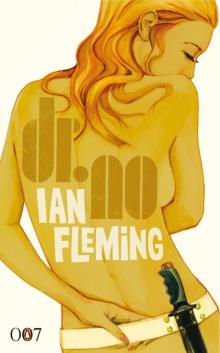 Doctor No
Doctor No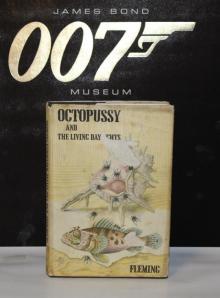 Octopussy & the Living Daylights
Octopussy & the Living Daylights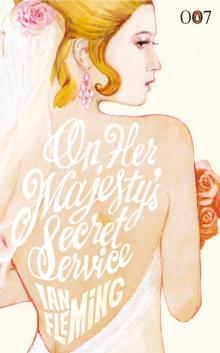 On Her Majestys Secret Service
On Her Majestys Secret Service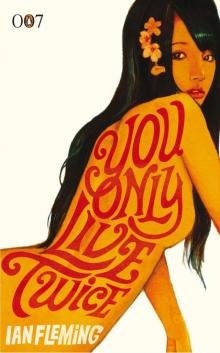 You Only Live Twice
You Only Live Twice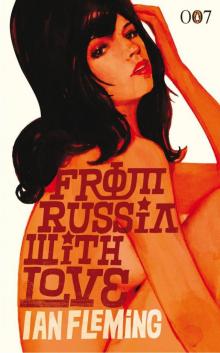 From Russia With Love
From Russia With Love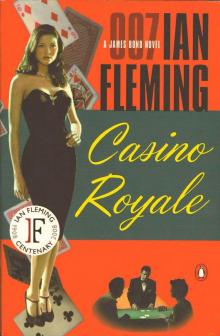 Casino Royale
Casino Royale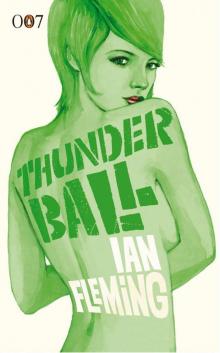 Thunderball
Thunderball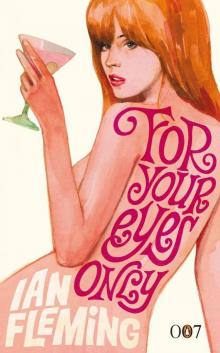 For Your Eyes Only
For Your Eyes Only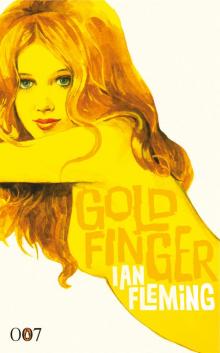 Goldfinger
Goldfinger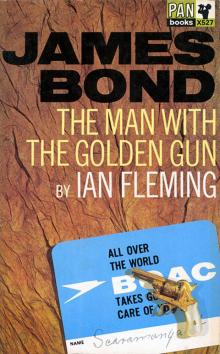 The Man With the Golden Gun
The Man With the Golden Gun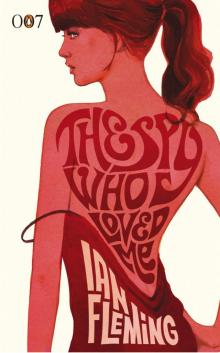 The Spy Who Loved Me
The Spy Who Loved Me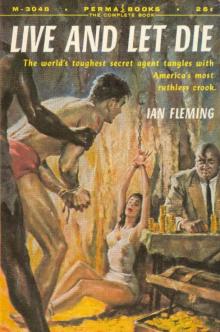 Live and Let Die
Live and Let Die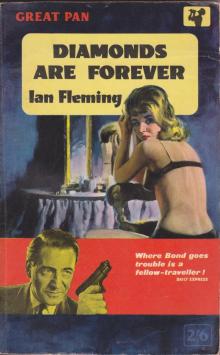 Diamonds Are Forever
Diamonds Are Forever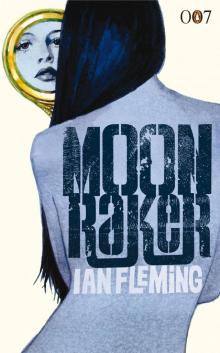 Moonraker
Moonraker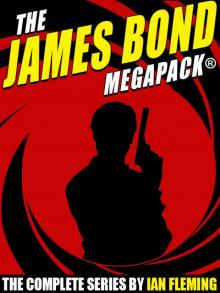 The James Bond MEGAPACK®
The James Bond MEGAPACK®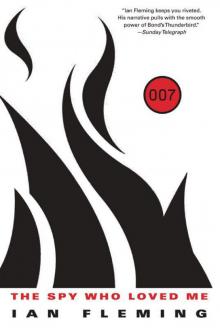 Bond 10 - The Spy Who Loved Me
Bond 10 - The Spy Who Loved Me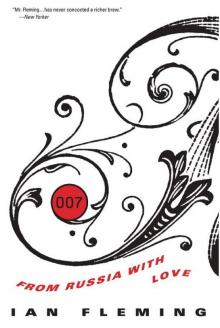 From Russia with Love (James Bond - Extended Series Book 5)
From Russia with Love (James Bond - Extended Series Book 5)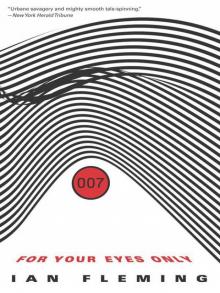 Bond 08 - For Your Eyes Only
Bond 08 - For Your Eyes Only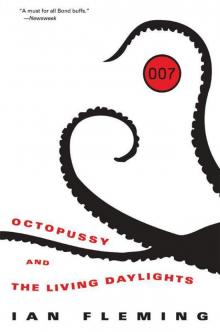 Bond 14 - Octopussy and the Living Daylights
Bond 14 - Octopussy and the Living Daylights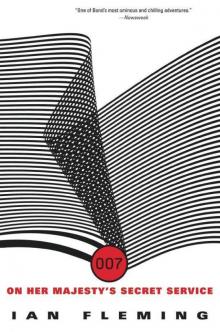 Bond 11 - On Her Majesty's Secret Service
Bond 11 - On Her Majesty's Secret Service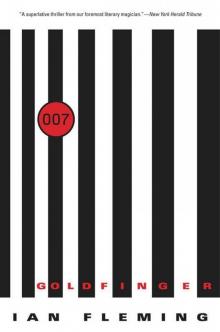 Bond 07 - Goldfinger
Bond 07 - Goldfinger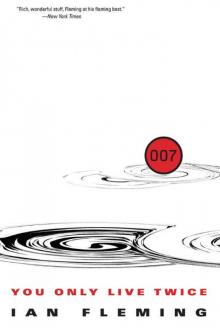 Bond 12 - You Only Live Twice
Bond 12 - You Only Live Twice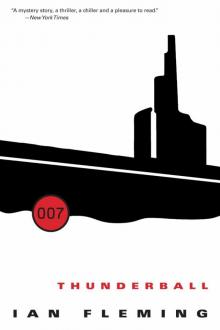 Bond 09 - Thunderball
Bond 09 - Thunderball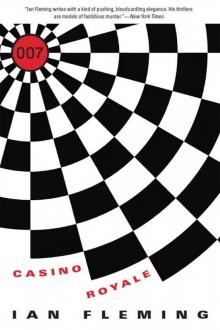 Bond 01 - Casino Royale
Bond 01 - Casino Royale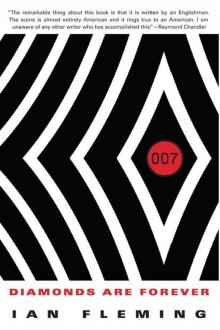 Diamonds are Forever (James Bond - Extended Series Book 4)
Diamonds are Forever (James Bond - Extended Series Book 4)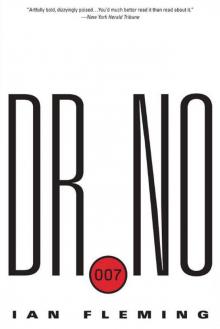 Bond 06 - Dr. No
Bond 06 - Dr. No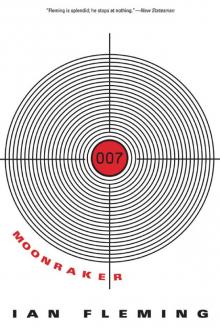 Moonraker (James Bond - Extended Series Book 3)
Moonraker (James Bond - Extended Series Book 3)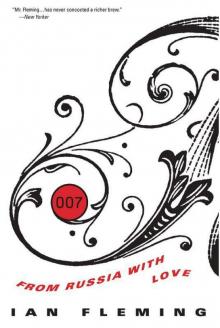 Bond 05 - From Russia With Love
Bond 05 - From Russia With Love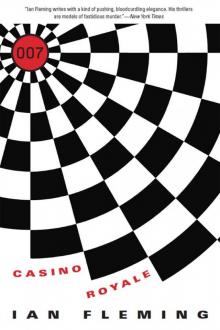 Casino Royale (James Bond - Extended Series Book 1)
Casino Royale (James Bond - Extended Series Book 1)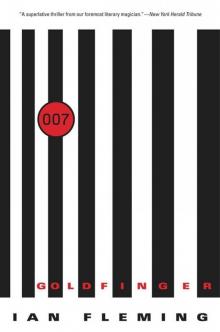 Goldfinger (James Bond - Extended Series Book 7)
Goldfinger (James Bond - Extended Series Book 7)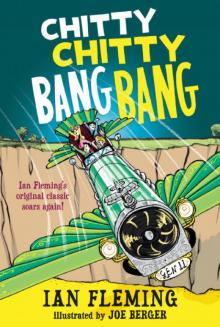 Chitty Chitty Bang Bang: The Magical Car
Chitty Chitty Bang Bang: The Magical Car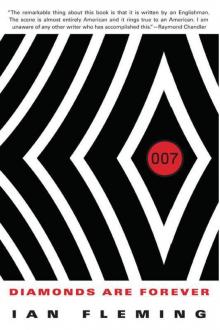 Bond 04 - Diamonds Are Forever
Bond 04 - Diamonds Are Forever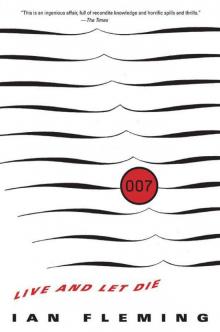 Bond 02 - Live and Let Die
Bond 02 - Live and Let Die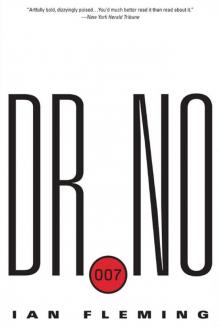 Dr. No (James Bond - Extended Series Book 6)
Dr. No (James Bond - Extended Series Book 6) The Hildebrandt rarity
The Hildebrandt rarity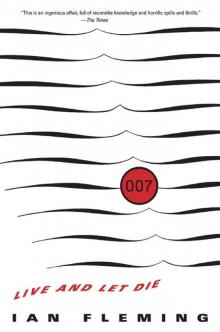 Live and Let Die (James Bond - Extended Series Book 2)
Live and Let Die (James Bond - Extended Series Book 2)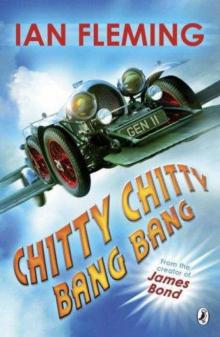 Chitty Chitty Bang Bang
Chitty Chitty Bang Bang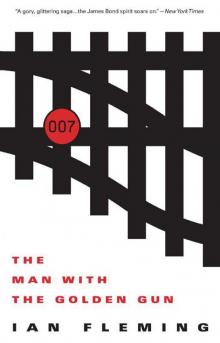 Bond 13 - The Man With the Golden Gun
Bond 13 - The Man With the Golden Gun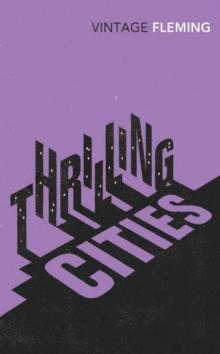 Thrilling Cities
Thrilling Cities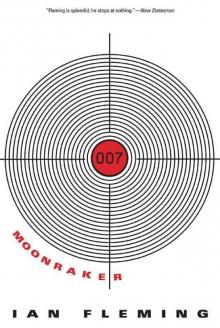 Bond 03 - Moonraker
Bond 03 - Moonraker